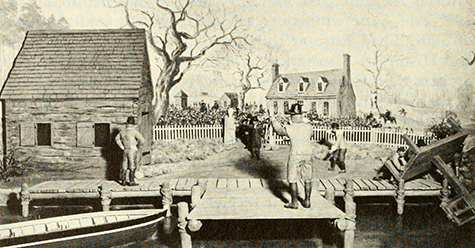ca. 1622–ca. 1684

John Willoughby (or Willoby, Willowby), Council member, public register, and leader in Culpeper's Rebellion, may have arrived in the North Carolina colony from Virginia, where at least one colonist bearing his name was living in the 1650s. On the other hand, he may have come from the Caribbean Islands, where the Willoughby family was prominent in his day and included members named John. Whatever his origin, a Captain John Willoughby was living in the North Carolina colony, then called Albemarle, by 1670 and was a member of the Council.
Willoughby was appointed to the Albemarle Council on 20 Jan. 1669/70, when he was made a Proprietor's deputy by Anthony, Lord Ashley, who later became the first Earl of Shaftesbury. At that time he also was named public register of the colony. The appointments were among a number of actions then being taken by the Lords Proprietors in order to bring the Albemarle government into conformity with the system provided in the recently adopted Fundamental Constitutions of Carolina. It is likely that the changes made were chiefly in organization, rather than personnel, and that some or all of the men named to the Council already were members. As the names of the previous Council members are not known, however, it is uncertain whether Willoughby was newly appointed or reappointed in January 1669/70.
He remained on the Council until the mid-1670s, when under a provision of the Fundamental Constitutions the terms of all members expired, including that of the president of the Council and acting governor, John Jenkins. For unknown reasons the Proprietors neither reappointed nor replaced the officials, so de jure government ceased to exist in Albemarle with the expiration of their terms. Despite the fact that their authority had not been renewed, Jenkins and the other Council members, including Willoughby, continued to govern for a time. But soon they were challenged by a faction headed by Thomas East-church, who, as speaker of the Assembly, seized the powers of governor, imprisoned Jenkins, and issued a summons for Willoughby to appear before him and his "court." Willoughby, who as a Council member was an ex officio magistrate, apparently had continued to hold court despite Eastchurch's claim to power. Instead of submitting to the summons, Willoughby beat the man sent to serve it. Soon afterwards he fled to Virginia and remained there until about December 1677, when he returned to Albemarle and helped lead the uprising called Culpeper's Rebellion. He subsequently went to London, along with another leader of the uprising, as agent for the "rebels" in presenting their cause to the Proprietors.
By November 1679 the Proprietors had reestablished de jure government in Albemarle, and Willoughby was a member of the new Council. Again he sat as deputy to Lord Shaftesbury, and, as in his earlier period of service, he was public register for the colony. He remained in office at least until 1682 and probably until his death.
The date of Willoughby's death is unknown. He was alive in the fall of 1682, when he gave his age as "Sixty Yeares or upwards" in a deposition, but he was dead by 3 Apr. 1684, when suits involving his estate were tried in the county court. Little is known of Willoughby's private life. As he was called captain, it seems likely that he was a master seaman, but the title could have denoted rank in the militia instead. He appears to have lived in Perquimans Precinct. No records concerning his family have been located, but a John Willoughby and a William Willoughby who were living in the colony in the 1680s and afterwards may have been his sons.